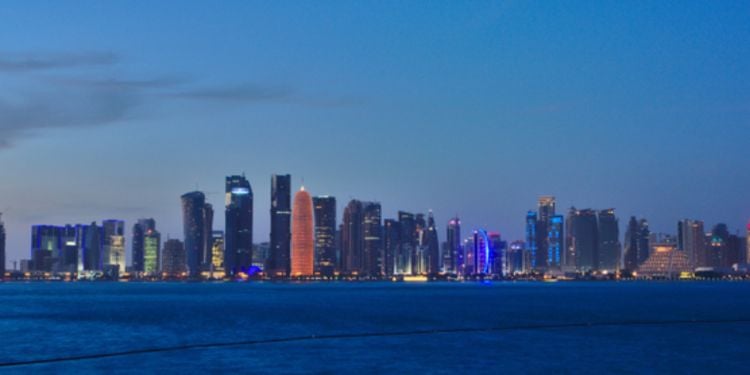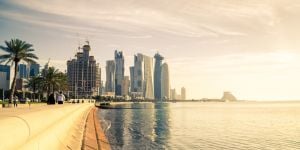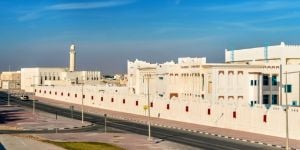
Owning a property in Doha is one of the most crucial decisions any person could ever make. There are a lot of things to consider, especially financing. The best thing about Qatar is th ere is no property tax on buying new properties in Qatar, making it comfortable for your budget. Below is a guide to help you understand how you can purchase a property as an expatriate.
Expats in any type of employment in Qatar must provide a Qatari ID, six months bank statement, a liability letter addressed to the bank where they applied for the mortgage and a title deed to become homeowners. Self-employed individuals must provide their business registration number and down payment as per the seller's requisition. A business statement of account must be declared within the full 12 months of income, as well as an audited financial statement for the last two years.
Legal framework for buying property in Doha
Buying property in Doha can be a significant investment and an opportunity to own a home or expand your real estate portfolio.
First, familiarize yourself with the legal framework and regulations governing property ownership in Qatar. Foreigners are allowed to buy property in certain designated areas called "Investment Zones" or through specific projects approved by the government.
Here are some key aspects to be aware of:
- Foreign Ownership: Non-Qatari individuals and entities are generally restricted from owning property in Qatar, except in specifically designated areas known as "Investment Zones." These areas are typically developed for foreign investment and offer opportunities for property ownership by non-Qataris.
- Investment Zones: The Qatari government has established several Investment Zones where foreign property ownership is allowed. These zones include areas such as The Pearl-Qatar, West Bay Lagoon, Lusail City, and Msheireb Downtown Doha. Each zone may have its own specific regulations and requirements.
- Freehold Ownership: Within the Investment Zones, non-Qatari individuals and entities can acquire freehold ownership of property. This means that the property is owned outright and can be transferred, inherited, or sold freely.
- Leasehold Ownership: Outside the Investment Zones, non-Qataris can acquire leasehold ownership of property. This means that they can lease the property for a specific duration, typically up to 99 years. The lease can be renewed upon expiration.
- Property Ownership by Qatari Companies: Non-Qatari individuals can also consider establishing a Qatari company, known as a Qatari Shareholding Company (QSC), to own property in Qatar. This allows for broader ownership rights and opportunities.
- Property Registry: All property transactions in Qatar must be registered with the Real Estate Registration Department at the Ministry of Justice. This ensures the legal validity and protection of property rights.
Important:
Engaging the services of a qualified lawyer with expertise in Qatari property laws is highly recommended. They can guide you through the legal process, review contracts and documents, and ensure compliance with applicable regulations.
It is also essential to stay updated on any changes in Qatari property laws and regulations, as they may evolve over time. Consulting with legal professionals, real estate agents, or government authorities can provide you with the most accurate and current information regarding property ownership in Qatar.
Property types in Doha
Doha offers a range of property types, including apartments, villas, townhouses, and commercial properties. Determine your budget, desired location, and the type of property that suits your needs.
Apartments/Flats
Apartments in Doha come in different sizes and configurations, ranging from studio apartments to multi-bedroom units. They are typically part of residential towers or complexes and offer amenities such as gyms, swimming pools, and parking facilities.
Apartments for sale in Doha can be found in both furnished and unfurnished conditions, depending on the specific property and the preferences of the seller. Here are some key points to consider:
Furnished apartments: Some apartments in Qatar are sold fully furnished, which means they come with furniture, appliances, and other necessary items. Furnished apartments are ready for immediate occupancy and are suitable for individuals or families who prefer a hassle-free move-in experience. Furnished apartments can vary in terms of the quality and style of the furniture provided.
Unfurnished apartments: Unfurnished apartments are sold without furniture and typically only include basic fixtures and fittings. This allows buyers to furnish the apartment according to their own preferences and needs. Unfurnished apartments are a suitable choice for individuals or families who already have their own furniture or prefer to personalize the interior space.
Prices: The prices of apartments in Doha can vary depending on several factors, including the location, size, amenities, and condition of the property. Generally, apartments located in prime areas or those offering premium facilities and services tend to be more expensive. Prices can also be influenced by market conditions and fluctuations. It is advisable to research the real estate market in Qatar, consult with real estate agents, and explore property listings to get an idea of the current prices for apartments in your desired location. Prices are over 1 million QAR for a studio version of an apartment.
Additional costs: In addition to the purchase price of the apartment, it is important to consider other costs associated with buying property in Qatar, such as agent fees, registration fees, legal fees, and maintenance charges. These costs can vary and should be factored into your budget when considering the overall affordability of the property.
When searching for apartments to buy in Qatar, it is recommended to consult with local real estate agents, browse online property portals, or visit property exhibitions to explore the available options. Working with a trusted real estate professional can help you navigate the market, understand the pricing trends, and find apartments that meet your specific requirements and budget.
Villas
Villas in Doha are standalone houses with their own private gardens and sometimes private pools. They come in various sizes and designs, ranging from small townhouses to large luxury villas. Villas often provide more space, privacy, and customization options compared to apartments. In Doha, prices for villas begin at about QR9,000/sqm and shoot up to QR25,000/sqm; the average is around QR15,000/sqm.
Townhouses
Doha's townhouses are usually multi-story units attached to one another in a row. They offer a balance between the space of a villa and the convenience of an apartment. Townhouses can have multiple bedrooms, private gardens, and parking spaces. Prices could range anywhere between QAR 1 million to QAR 10 million.
Compound villas
Doha's compound villas are part of gated communities that offer shared facilities and amenities such as swimming pools, clubhouses, sports facilities, and security services. These compounds are popular choices for families due to the added security and community atmosphere. Prices could range anywhere between QAR 1 million to QAR 10 million.
Commercial properties
If you are looking for an investment opportunity or want to establish a business in Doha, there are various commercial properties available for purchase. These can include office spaces, retail units, warehouses, and land for development.
Mixed-use developments
Doha also features mixed-use developments that combine residential, commercial, and retail spaces in a single project. These developments provide a comprehensive living and working environment, with easy access to amenities and services.
Research Doha's property market
When considering the type of property you would like to buy in Doha, factors such as your budget, lifestyle preferences, family size, and long-term goals should be taken into account. It is advisable to work with a reputable real estate agent who can guide you through the available options, provide market insights, and help you find a property that meets your specific requirements. Popular websites to look for property In Qatar are Property finder, FGREALTY, , Qatar Sale, among others.
It is recommended that you conduct thorough research on the Doha property market as a foreigner to understand current trends, property prices, and projected returns on investment. Consider factors such as location, amenities, infrastructure development, and potential growth areas. Popular neighborhoods in Doha to buy property in are West Bay, The Pearl-Qatar, Lusail City, Al Waab, Al Sadd, Bin Mahmoud etc.
Steps for purchasing a property in Doha
Financing
Determine your financial capacity and explore financing options if needed. Local and international banks in Qatar offer mortgages to eligible buyers, subject to certain conditions. Consider the interest rates, loan terms, and eligibility criteria before applying for a mortgage.
When buying a property in Doha, Qatar, you may consider financing options to help fund your purchase. Here are some common financing options available:
- Personal savings: Using personal savings or funds from your existing assets is a straightforward way to finance a property purchase. It allows you to avoid interest charges and reduces the need for external financing.
- Mortgages: Local banks in Qatar offer mortgage loans to eligible buyers, including both residents and non-residents. To apply for a mortgage, you will typically need to meet certain criteria, such as having a stable income, providing proof of employment, and meeting the bank's credit assessment requirements.
- Down payment: When obtaining a mortgage in Qatar, you will usually be required to make a down payment towards the property purchase. The down payment amount can vary depending on the bank and the type of property you are buying. Typically, it ranges from 15% to 20% of the property value, but it can be higher for foreign buyers.
- Mortgage terms: Mortgage loans in Qatar typically have a maximum repayment period of 20 to 25 years, although the exact term may vary depending on the bank and your eligibility. The interest rates on mortgages can be fixed or variable, so it's important to carefully consider the terms and choose an option that suits your financial situation. It's worth noting that locals banks in Qatar are not reluctant to give loans to foreigners as long as they are eligible. Banks usually check your credit history and other details to lend out a loan to you. It is, therefore, important to maintain a good credit history.
- Pre-approval: It is advisable to obtain pre-approval for a mortgage before starting your property search. This process involves the bank evaluating your financial situation and providing you with an estimate of the loan amount you are eligible for. Pre-approval can give you a clear understanding of your budget and help streamline the property-buying process.
- Mortgage fees: When taking out a mortgage in Qatar, there are certain fees and charges to consider, such as application fees, valuation fees, and processing fees, insurance fees. It's important to inquire about these fees upfront and factor them into your budget. Please note that the following estimates are rough and can vary based on the specific terms and conditions of the mortgage and the financial institution you choose. These estimates are provided for informational purposes only:
- Processing fee: The processing fee can range from 0.5% to 1% of the loan amount. For example, if you are borrowing QAR 1,000,000, the processing fee could be approximately QAR 5,000 to QAR 10,000.
- Valuation fee: The valuation fee can vary based on the property's value and complexity, but it is typically around 0.1% to 0.2% of the property value. For instance, if the property value is QAR 2,000,000, the valuation fee could be approximately QAR 2,000 to QAR 4,000.
- Mortgage registration fee: The mortgage registration fee is usually a percentage of the mortgage amount, typically ranging from 0.25% to 0.5%. For example, if the mortgage amount is QAR 1,500,000, the registration fee could be approximately QAR 3,750 to QAR 7,500.
- Insurance fees: The insurance fees can vary depending on the type of insurance coverage required. As an estimate, the insurance fees can range from 0.5% to 1% of the loan amount. Using a loan amount of QAR 1,000,000, the insurance fees could be around QAR 5,000 to QAR 10,000.
- Early settlement fee: The early settlement fee can be a percentage of the outstanding loan amount, typically ranging from 1% to 3%. For example, if you have an outstanding loan amount of QAR 800,000 and decide to settle it early, the early settlement fee could be approximately QAR 8,000 to QAR 24,000.
These estimates are not exact figures and can vary based on individual circumstances and the policies of the financial institution. It is crucial to consult with specific banks or financial institutions to obtain accurate and up-to-date information regarding their mortgage fees.
- Islamic financing: Islamic banks in Qatar offer Sharia-compliant financing options for property purchases. Islamic financing operates on the principles of Islamic law, which prohibits the charging or receiving of interest. Instead, Islamic financing structures are based on profit-sharing, leasing, or other permissible models. Islamic banks in Qatar and other countries do provide loans to foreigners who are non-Muslims. Non-Muslim foreigners seeking financing from Islamic banks may need to meet certain criteria, such as having a valid residency permit, meeting income and employment requirements, and providing necessary documentation.
Before proceeding with any financing option in Qatar, it is recommended to consult with different banks and compare mortgage terms, interest rates, fees, and eligibility requirements. This will help you make an informed decision based on your financial situation and preferences.
Property viewing and due diligence
Visit properties of interest in person to assess their condition, layout, amenities, and suitability to your requirements. Take note of any maintenance or renovation needs, and factor those into your decision-making process.
Conduct thorough due diligence on the property, including verifying the ownership, checking for any outstanding debts or liens, and ensuring the property has all the necessary permits and approvals. It's advisable to engage a lawyer specializing in real estate to assist with the legal aspects of the transaction.
Negotiation and offer
Once you find a property you're interested in, negotiate the price and terms with the seller. Submit a formal offer outlining the proposed purchase price, payment terms, and any additional conditions while keeping the following in mind:
- An initial offer that is fair and reasonable: It should take into account market conditions, property conditions, and your budget.
- Flexible terms: Aside from the price, consider other terms that can be negotiated, such as the closing date, the inclusion of certain furnishings or appliances, or any repairs or renovations that you would like the seller to undertake.
- Professional representation: If you are unfamiliar with the negotiation process in Qatar or would like expert guidance, consider hiring a reputable real estate agent or lawyer. They can advocate on your behalf, provide advice, and help facilitate the negotiation process.
- Maintain a professional approach: Keep the negotiation process professional and courteous. Avoid making overly aggressive or unrealistic demands that may hinder the negotiation process. Instead, focus on finding a mutually beneficial agreement.
Remember that negotiation is a two-way process, and the seller may counteroffer or reject your initial offer. Be prepared to engage in a back-and-forth exchange until an agreement is reached or you decide to walk away. Patience, flexibility, and effective communication are key to successful negotiations when buying a property in Doha.
Sales agreement and documentation
If your offer is accepted, work with your lawyer and the seller's representative to prepare a sales agreement that outlines the terms and conditions of the purchase. Ensure that all necessary documentation, including the title deed and other legal documents, are properly prepared and reviewed.
Registration and transfer
Once the sales agreement is finalized, the property transfer process begins. The necessary documents and fees are submitted to the relevant government authorities for registration and transfer of ownership. Your lawyer or real estate agent can guide you through this process. The buyer should normally expect to pay fees of about 0.35% of the purchase price to the Land Registry Office called registration fees.
It's important to seek professional advice and thoroughly understand the legal and financial implications before buying property in Doha. Each property transaction may have unique considerations, so consulting with legal, financial, and real estate professionals is highly recommended to ensure a smooth and successful buying process.
We do our best to provide accurate and up to date information. However, if you have noticed any inaccuracies in this article, please let us know in the comments section below.








